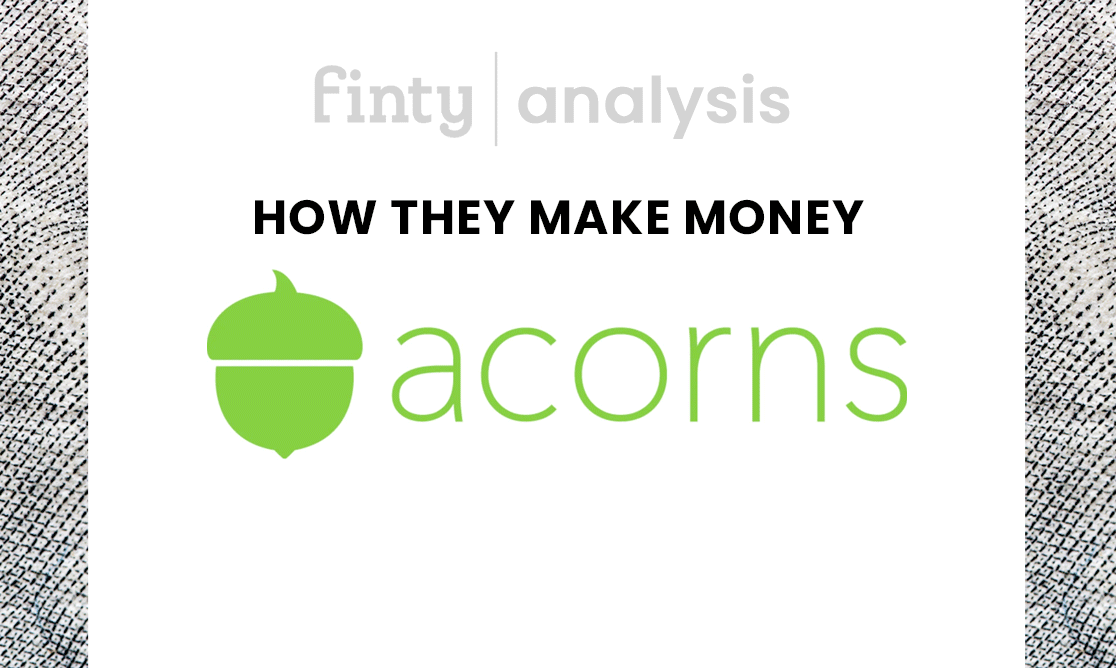- Acorns is a fintech platform that enables beginners to build their wealth through micro-investing.
- Acorns rounds up your credit and debit card purchases to the nearest dollar, investing the change in a diversified portfolios of ETFs.
- Acorns announced it will IPO by the end of 2021, using the proceeds to invest in future growth, including new products and strategic acquisitions.
Acorns let you define and achieve your savings goals through micro-investing. Users round up their spare change and invest it to compound their wealth. In addition, Acorns offers a range of services such as retirement savings accounts, debit cards, and other basic banking services.

Coming up next
What do Acorns do?
Founded in 2012 with offices in Irvine, California, Acorns has an established reputation as one of the most-used investment apps in the US.
Acorns is a mobile platform offering users the chance to start saving and investing through better spending. Members can open savings, investment, and IRA accounts, through the platform.
Acorns also runs cashback programs with partner retailers to help users save, and it makes money by charging membership subscription fees and management fees on accounts with balances over $5,000.
How does Acorns work?
This fintech company offers users several options for saving and investing without impacting their spending habits. The company's flagship product, "Invest," offers a micro-investing platform to users, allowing them to invest spare change into managed portfolio investments.
Users create investment portfolios in seconds with a simple click, choosing from a set of custom investment strategies, from conservative to aggressive, in line with their risk appetite.
Acorns then links its platform to the user's debit card or credit card and their bank account. If, for example, the user buys a coffee for $3.69, Acorns rounds up the purchase to $4, allocating the $0.31 to the user's micro-investing account. The app starts investing when the user's savings total reaches $5, at which time the robo-advisory invests in a mix of exchange-traded funds (ETFs) determined by the user’s risk appetite.
When the users start seeing their wealth grow, Acorns offers the opportunity to shift some or all of the portfolio value into an IRA product. Client accounts are FDIC insured, and users can download Acorns for their Android or iOS device.
How Acorns make money
Acorns make money by charging users subscription fees to its platform, management fees, referrals, and interest earned on cash.
Let's unpack the Acorns business model in detail.
Subscriptions
Acorns offer subscription tiers - Personal, Lite, and Family - with bundled products in each level.
The Lite package is the most affordable, with a $1 subscription fee, and users get access to Acorns Invest. Lite users earn bonuses with any transaction at one of the more than 350 Found Money partners. Some of the partners include retailers like Dollar Shave Club, Warby Parker, and Sephora.
The Personal tier costs $3 per month, including Acorns Invest and the "Later" and "Spend" products. Acorns Later gives users access to IRAs, while the Spend product provides users with a checking account. The checking account comes with no ATM or account fees, up to a 10% bonus investment, and an investment account.
The Family tier costs $5 per month, with all the features of the Personal package, along with Acorns Early. Acorns Early gives users the chance to open investment accounts for kids and set automatic recurring investment strategies, as well as financial planning and advice.
Referral Fees
Acorns earn referral fees from its Found Money partners when its members make purchases through the partner retail outlets.
Management Fees
Acorns charge a 0.25% management fee on account balances over $5,000.
Interest On Cash
Acorns use user cash balances to provide loan facilities to financial institutions and banks; Acorns earns money on these short-term loans.
Future growth engine
Acorns is expecting significant growth in the coming years, with a user base of 4 million customers in 2021 expected to grow to 10 million customers by 2025. As their average customer is only 34 years old, Acorns has an opportunity to retain customers for years.
In May 2021, Acorns announced it will go public in the second half of 2021. This will generate funds that can be dedicated to providing new tiers of investment as their customers start to mature in their investment capacity, new products, strategic acquisitions, and global expansion.
Acorns is partnering with the Rise Fund, founded by TPG Capital. The Rise Fund promises to offer Acorns users competitive financial investment strategies with outstanding returns. The investment from The Rise Fund enables Acorns to continue development on its platform and product offering.
Competitors
Acorns is one of the leading fintech companies involved in assisting millennials with saving and investing. Although it benefitted from the first-mover advantage in the market, being the first app of its kind to gain a large following, Acorns faces stiff competition.
Over the last five years, many wealth management and investing apps have come to market with the aim of targeting the same customer base. As a result, Acorns competes with Robinhood, Betterment, Stash, Wealthfront, SigFig, FutureAdvisor, and Personal Capital, among others.
These companies all have similar offerings to Acorns, although Acorns benefits from a larger user footprint and a well-established reputation in the market.

